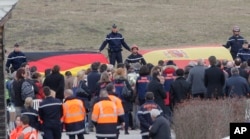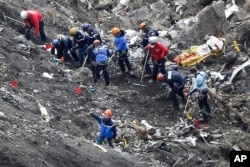The co-pilot of the Germanwings passenger jet that crashed in the French Alps this week made a "deliberate attempt to destroy the aircraft," a French prosecutor said.
Marseilles prosecutor Brice Robin said Thursday the co-pilot, 28-year-old Andreas Lubitz, locked the pilot out of the cockpit, leaving himself alone in control of the Airbus A320.
The prosecutor said Lubitz then "accelerated the descent" of the aircraft, flying it at 700 kilometers an hour and crashing it into the mountains in southeastern France, killing all 150 people aboard.
At a press conference in Marseille, Robin said the most plausible explanation currently was that the co-pilot wanted to deliberately destroy the plane.
"The descent could only have been done deliberately," Robin said. "In all circumstances, it is deliberate. There is nothing to suggest a terrorist attack, but we will see the circumstances of that person."
He added the co-pilot, a German national, crashed the plane "for a reason we cannot fathom right now."
The prosecutor said investigators, reviewing sound on the plane's cockpit voice recorder, heard increasingly desperate knocks on the cockpit's locked door as the captain, whose name has not been disclosed, tried to get back in.
But Robin said Lubitz refused to open the door and had no contact with air traffic controllers in the flight's final minutes.
Watch video report from VOA's Zlatica Hoke:
It was bound from Barcelona, Spain, to the German city of Dusseldorf, with 144 passengers on board and six crew members.
Robin said that based on the sounds on the cockpit voice recorder, passengers only realized at the very end that the plane was about to crash.
"We hear some screams only at the last moment," he said. "Death was instant."
The prosecutor declined to call Lubitz's actions a suicide.
"I do not call it a suicide when you have 150 people behind you," he said.
The prosecutor said Lubitz had flown the A320 "a few months," about 100 hours "on this type of plane." Lufthansa, the corporate parent of its budget carrier Germanwings, said that overall the pilot had 6,000 hours of flight experience and Lubitz 630.
Robin said he met with families of the victims before disclosing his conclusions about the flight's demise.
"The families were in shock," he said. "They found it difficult to believe."
At a later press conference on Thursday, Lufthansa chief executive Carsten Spohr said he was "stunned" by the French prosecutor's conclusion that Lubitz deliberately crashed the jet.
He described Lubitz as "100 percent fit to fly without any restrictions" and said he had passed all of the airline's technical and medical examinations, although the medical oversight did not include psychological testing. Spohr said the airline chooses its staff "very, very carefully."
Lufthansa said co-pilot Lubitz was accepted in 2008 into a pilot training program that normally lasts from a year and a-half to two years. Lubitz is said to have interrupted his training at one point, for reasons not immediately clear on Thursday.
One source familiar with the cockpit voice recording said the pilot "is knocking lightly on the door [of the cockpit] and there is no answer. And then he hits the door stronger and no answer. There is never an answer.''
One investigator said the pilot could be heard trying to break the cockpit door down.
While recovery teams probe the wreckage for victims' remains, the second black box and for other clues to the cause of the crash, family and friends of the passengers and crew are making their way to the crash site.
Lufthansa has said it will provide counselors at the site and ask for help identifying remains.
In the small German town of Haltern, home to 16 teenage students and two teachers presumed dead in the crash, students at their school gathered around a makeshift memorial of candles, flowers, and signed messages for a moment of silence Thursday.
People from at least 18 countries were aboard the flight, with 72 Germans and at least 35 Spaniards among the casualties.
In Berlin, German Chancellor Angela Merkel said, "Something like this goes beyond the realms of the imaginable. This is a terrible burden for the relatives of the victims."
French prosecutor Robin said there was nothing at the moment to suggest a terrorist attack. He earlier briefed families of the victims who are arriving in France and heading to the crash site.
The investigation has broadened to look at Lubitz's background.
The picture on his Facebook page shows Andreas Lubitz wearing a jacket and a smile as his sits on a rocky ledge over San Francisco's Golden Gate Bridge. He looks carefree and happy. Not the kind of person who would deliberately crash a plane into a mountain, killing himself and the other 149 people on board.
The first media reports into Lubitz background offer few clues about a possible motive. He lived in the town of Montabaur, near Frankfurt, and apparently had many friends. A member of the glider club to which he belonged told the Associated Press he was happy with his Germanwings job and was doing well.
But aviation experts suggest a pilot's job can be mentally and emotionally stressful. The book "Anxiety at 35,000 Feet" notes that pilots must juggle complex tasks, are closely scrutinized, and live with the fear of losing their job if they do not meet the mark. Some have problems with substance abuse and relationships because of their difficult and transient lifestyles.
There have been previous plane crashes that investigators believe to have been deliberate. Lufthansa CEO Carsten Spohr said the company's pilots underwent yearly medical exams.
In 1999, an EgyptAir plane crashed en route from New York to Cairo under what appears to be eerily similar circumstances.
A report by the U.S. National Transportation Safety Board concluded it was because of a "co-pilot manipulation of the airplane controls," but did not use the word suicide.
Bryant reported from Paris and Bredemeier from Washington.









